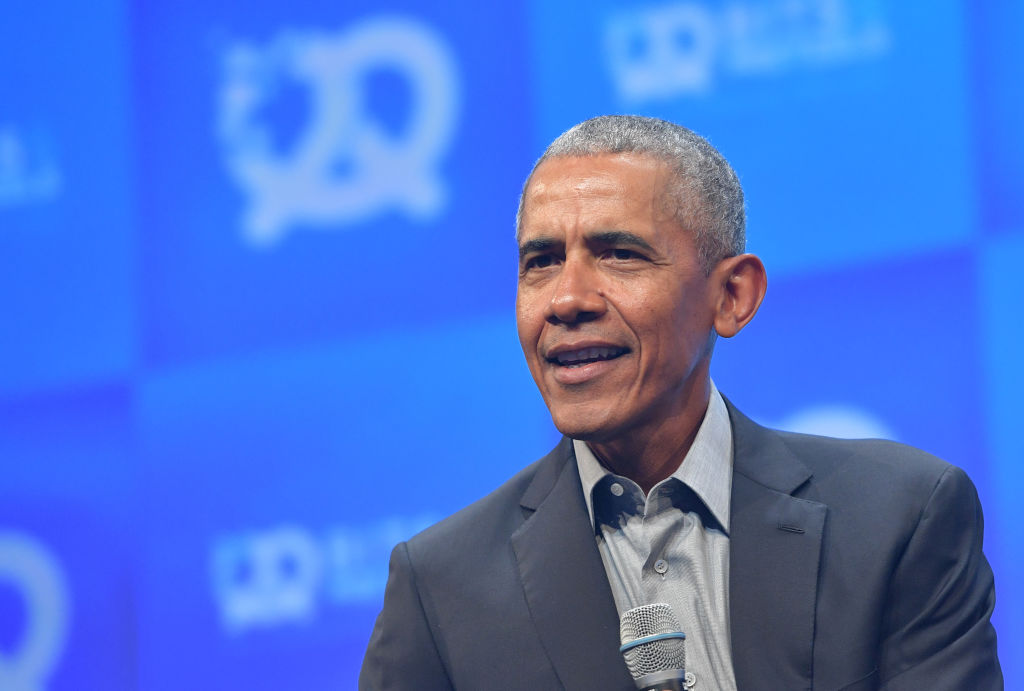Obama Pleads People To Vote After Trump Is In 'Denial' Of Global Crises
Obama Pleads For People To Vote After Trump Continues To Be In ‘Denial’ Of Global Crises

Source: Hannes Magerstaedt / Getty
Every now and then, former President Barack Obama has to hop on Twitter and call out Donald Trump’s administration for their grave shenanigans. But of course, he does it in the most civil, presidential way possible.
This week, Trump rolled back one of the strongest attempts by Obama’s administration to combat climate change. According to The Guardian, Trump’s moves will weaken rules which compel auto companies to produce more fuel-efficient vehicles. Critics say Trump’s roll-backs will lead to more life-threatening air pollution and force Americans to spend more on gas.
The changes will sanction the emission of about a billion more tons of heat-trapping carbon dioxide, which is equivalent to about a fifth of annual U.S. emissions. The rollback is the latest one Trump officials have carried out to completion, seeking to bolster the fossil fuel industry amid severe opposition from Democratic-led states and criticism from world leaders.
Obama tweeted about the detrimental move, referencing Trump’s handling of the coronavirus pandemic. “We’ve seen all too terribly the consequences of those who denied warnings of a pandemic,” he tweeted. “We can’t afford any more consequences of climate denial.”
When reports of people contracting the coronavirus surfaced, Trump initially downplayed the gravity of the situation. One of his first statements was, “We have it totally under control,” before he added, “It’s one person coming in from China.”
At one point, he even said, “We’re the number one travel destination anywhere in the world, yet we have far fewer cases of the disease than even countries with much less travel or a much smaller population.” Trump said this at the end of February.
As of Wednesday, the United States has had the most coronavirus cases in the world with 188,247 reported cases and at least 3,921 deaths, according to The New York Times.
Obama continued in his tweet, urging the importance of voting. “All of us, especially young people, have to demand better of our government at every level and vote this fall,” he wrote.
Miles Keogh, the executive director of the National Association of Clean Air Agencies, a group of state and local air regulators, deemed the timing of Trump’s rule change “appalling”.
“We know coronavirus preys on people with respiratory problems, and this dirty air rule will make more Americans vulnerable,” he wrote.
As is often the case, Black people will feel the brunt of the change, considering Black people are way more likely to die form conditions like asthma and heart disease, according to the Office of Minority Health.
Ann Carlson, a professor at the University of California in Los Angeles, said the legal fight against Trump will be “one of the hardest fought, in part because it’s the most significant”.
“You can make cars with zero emissions now, zero greenhouse gases that don’t run on petroleum any more,” Carlson said. “So I think the big beneficiaries are absolutely the oil companies.”
Speaking on Trump’s rollbacks, Paul Billings, senior vice-president of advocacy for the American Lung Association, also explained:
“This will mean there will be more pollution associated with oil extraction, transport, refining – sort of all the way from the well to the pump. This will mean high levels of smog, more coughing, wheezing, shortness of breath, asthma attacks, COPD (chronic obstructive pulmonary disease) exacerbations and also more particulate pollution.”
Communities closer to oil processing facilities and highways will be hit hardest by the pollution and these communities tend to be people of color or poor communities.
SEE ALSO:
Notable Black People With Confirmed Coronavirus Cases
Who Is Getting Tested For Coronavirus? Black And Brown ‘Hot Spots’ Called Out



















